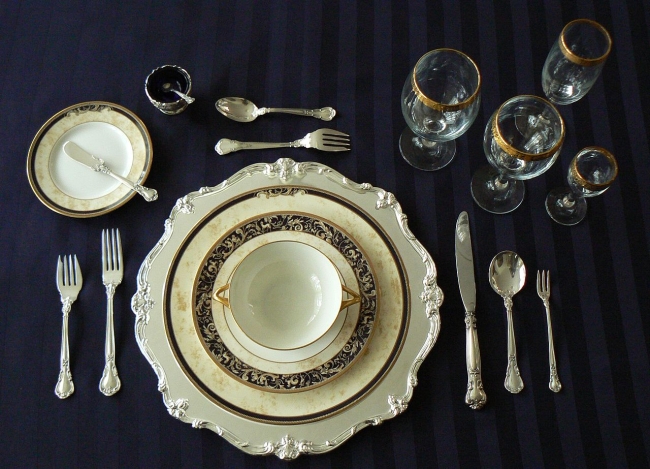You have /5 articles left.
Sign up for a free account or log in.

Wikipedia
If you are a finalist for a faculty position, you may be invited for a campus visit, which will likely involve not only formalities such as interviewing, giving a job talk or giving a teaching demo, but also the somewhat more informal activity of dining with the search committee and department faculty members. Why is dining included in the interview process and how does it factor into the search committee’s assessment of a candidate? What should you do -- and not do -- during lunch or dinner with your prospective colleagues in order to make the right impression? Here’s a breakdown:
What to Be Aware Of:
- First, don’t assume you are off the record or free from scrutiny while having a meal with faculty. Every step of the campus visit, from the moment you are picked up at the airport or train station to the lunch or dinner you have with the search committee, should be treated as part of the interview process. The impression you make upon faculty will inevitably be shaped by both the formal and informal aspects of the interview process.
- Treating the entire day as an ongoing interview will also help you remain alert: be especially aware of how questions that cannot be asked during a formal interview might be worked into more casual conversations. You are not obligated to disclose information such as whether or not you have a spouse or partner who would be affected by your taking this position, and you should be on the watch for how faculty might try to squeeze that sort of information out of you over lunch or during a car ride to a restaurant.
- Remember that dining is included in the interview process in part because search committees are looking for somebody who will be a good fit in the department, a likeable colleague personally as well as professionally. Especially in the case of a full-time, tenure-track position, faculty may be thinking about the amount of time they will have to spend with the hired person in department meetings and on service committees. No matter how nervous you may be, do your best to act friendly and collegial -- give the impression that you are someone others will be able to get along with during the many hours department faculty members spend with one another.
What to Talk About:
- Use some of the mealtime to ask faculty members about themselves and their research. The whole day has (necessarily) been about you, but you can use lunch or dinner to demonstrate your collegiality by showing interest in others and getting to know more about your prospective colleagues. Academics like to talk about themselves and their work, and giving others the opportunity to do so may help you win a few extra brownie points.
- Be comfortable with conversations that aren’t about work. As I suggested above, dining offers faculty a chance to see how personable you are and how well you relate to others. At teaching-oriented institutions, in particular, dining might be a way to further gauge how well you will connect not only with colleagues but also with students. If you can’t make conversation about anything but your research, committee members may worry about your ability to talk with students in ways they can relate to and about topics that interest them.
- Talk only to your present company. No matter what, you should not take out your cell phone to check or send text messages while you are dining with faculty, or even while you are waiting to be seated or driving to a restaurant. If you absolutely need to touch base with someone during a meal that is running later than expected, excuse yourself and use your phone in the bathroom.
What to Order:
- If you are having lunch and have other engagements after the meal, be sure not to eat anything that might upset your stomach or leave you feeling full or fatigued. Opt for something that will energize you, like a light, protein-based meal.
- Avoid meals that are messy -- you don’t need added stress by having to worry about crumbs or a sauce stain on your shirt. Also steer clear of foods that might get caught in your teeth (poppy seeds, corn, rib or chicken meat) or sour your breath (garlic, fish).
- Regardless of what you order, don’t assume you will actually eat! Because you will do a lot of talking and be asked a lot of questions throughout a meal with faculty, you may not get a chance to finish your dish, or even really get started on it. Nervousness may also make eating prove more difficult than usual. If this meal is your only opportunity for sustenance throughout a long day, plan beforehand by stashing some snacks in your briefcase in case you don’t get a chance to have a solid lunch.
- When it comes to alcohol at dinner, don’t order a drink (however much you might want one!) unless other members of the party have ordered alcoholic beverages and it feels appropriate or necessary to follow suit. If you do order alcohol, limit it to one drink only, no matter how many drinks others might have. If another member of the party orders drinks for the entire table, feel free to politely decline if you don’t drink alcohol.
- Another thing to consider before ordering a drink is whether alcohol might add to your exhaustion. If you are having dinner with the faculty, this will likely be the final activity of a very long and demanding day, and you don’t want fatigue to get the best of you. If you feel yourself fading, opt for an espresso over a glass of wine, and do your best to remain upbeat and conversational, no matter how long the meal goes on.








